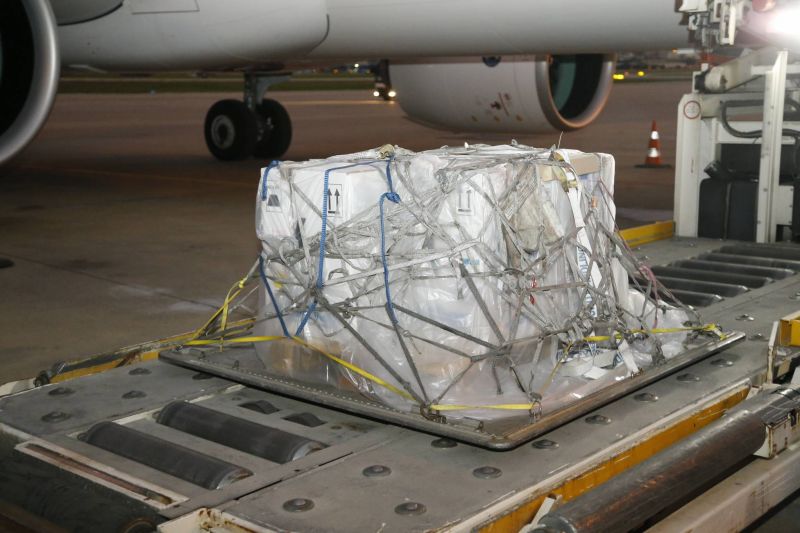
The first batch of COVID-19 vaccines arrived at Beirut’s airport late Saturday afternoon. (Credit: Dalati & Nohra)
BEIRUT — The first batch of COVID-19 vaccines arrived in Lebanon on Saturday, with officials vowing they would be distributed fairly on the basis of priorities laid out in the national vaccination strategy.
Under the strategy, the first doses are set to go to health care personnel, the elderly and those with pre-existing chronic conditions.
After their arrival at Beirut’s Rafik Hariri International Airport late Saturday afternoon, the 28,500 doses of the Pfizer-BioNTech vaccine were set to be stored in the Health Ministry’s freezers and then distributed to accredited hospitals. They will be handed out in limited numbers beginning Sunday before distribution is expanded on Monday, the head of the national vaccine committee, Abdul Rahman Bizri, tweeted earlier this week.
The World Bank, which is providing the majority of the financing for the vaccines, announced Friday that the International Federation of Red Cross and Red Crescent Societies would independently monitor the distribution process to “ensure safe handling of the vaccines, as well as fair and equitable access to all.”
Separately, the World Bank’s vice president for the Middle East and North Africa, Ferid Belhaj, tweeted, “We will monitor fair and transparent distribution to priority groups.”
On Saturday, caretaker Health Minister Hamad Hassan promised that vaccine distribution would be conducted “without political or sectarian considerations.”
The focus on fair distribution comes as vaccinations centers continue to ramp up their capacity.
Rafik Hariri University Hospital, the leading hospital for treating coronavirus patients and soon to be a major inoculation center, was ready to receive doses after installing three ultra-low temperature freezers at its facilities.
The hospital will receive some four additional freezers in the coming days, said Maha Naous, who is in charge of the hospital’s medical warehouse.
Firass Abiad, the hospital’s director, tweeted that receiving the vaccine represents “the best gift one can ask for on Valentine’s Day,” which falls on Sunday.
The opportunity to begin inoculating staff comes as patients continue to flock to the Beirut hospital.
“We receive around twenty patients daily; our coronavirus emergency units are nearly always full,” said Hussein Kataya, the nurse in charge of the hospital’s coronavirus emergencies.
The country witnessed 46 COVID-19 deaths Saturday, bringing the human toll to 3,961, while 2,906 people tested positive, according to the Health Ministry.
Since the year began, Lebanon has registered 155,539 COVID-19 infections, representing 46 percent of all cases since the virus was first detected in the country on Feb. 21, 2020.
On Monday, Lebanon eased its toughest countrywide lockdown, despite many hospitals across the country still operating at nearly full ICU capacity. Nearly nine in every 10 of the country’s 1,046 intensive care units were full as of Thursday evening, according to the latest figures from the World Health Organization.
“All our intensive care beds are currently occupied,” said Georges Juvelekian, the head of the ICU at Beirut’s St. George Hospital, commonly known as Mustashfa Roum, which is also set to be a major COVID-19 inoculation center.
The situation, however, has slightly improved during the lockdown, as some patients would previously have to wait outside the hospital or be treated in their cars, he added.
“This isn’t the case anymore; we do not have any critical cases waiting for a bed,” Juvelekian said.